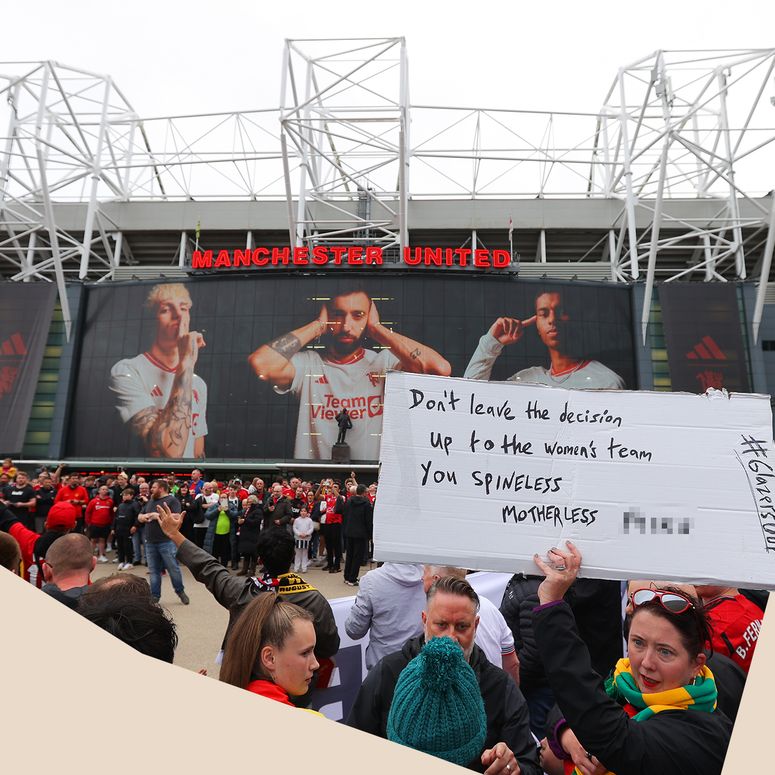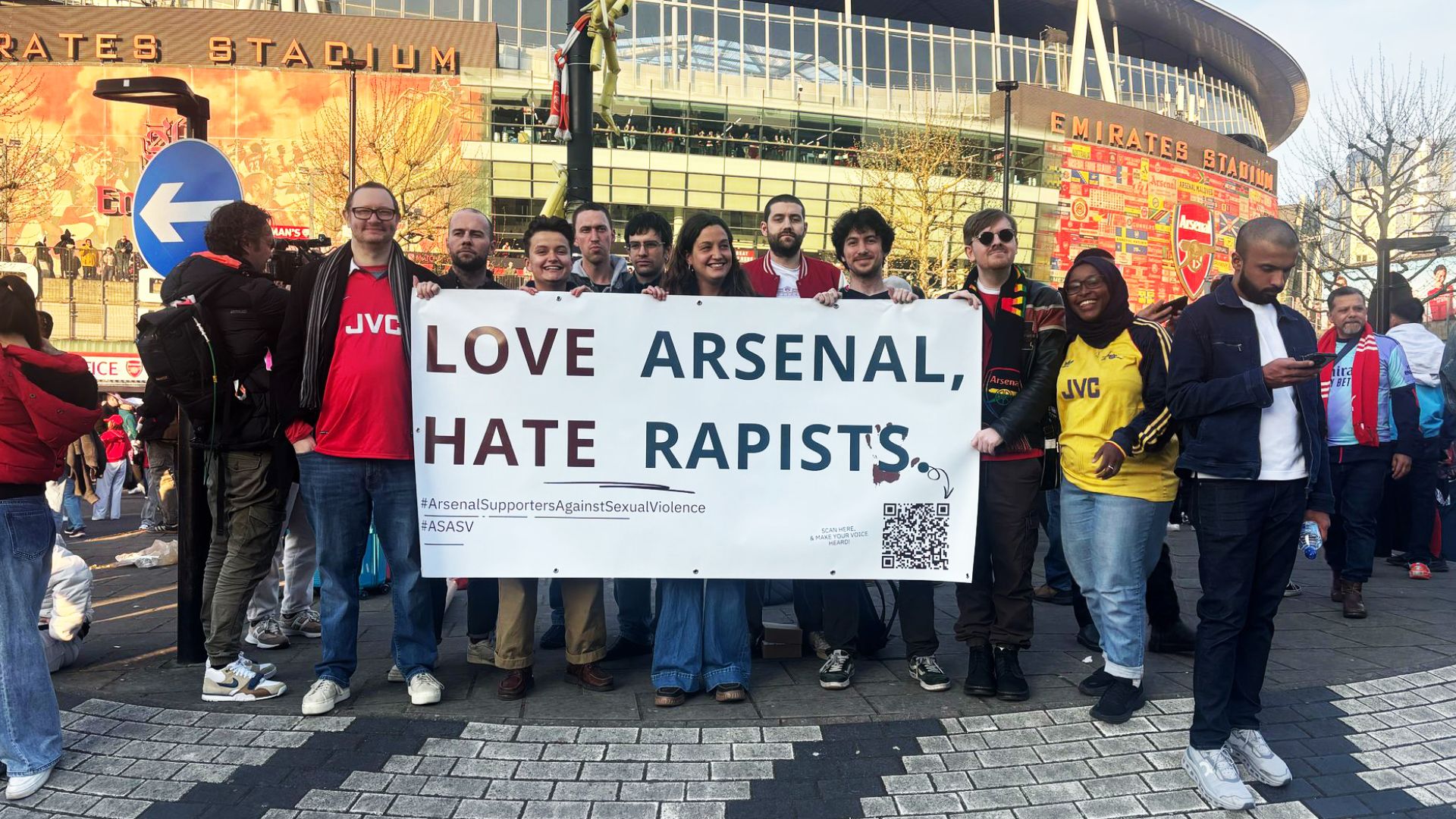This article references sexual assault.
Over the past few months, a collective of Arsenal fans, known as Arsenal Supporters Against Sexual Violence, has been protesting outside the Emirates Stadium on match days. Their goal? To demand “accountability, transparency, and a commitment to safeguarding” within football.
The campaign has penned an open letter to Arsenal Football Club calling for clear communication regarding the steps the club would take to address any concerns around sexual violence, to promise to suspend any individual that may come under investigation for criminal offences, and to offer tangible support for victims and their families affected by these issues within the club.
On four occasions, including Tuesday night's Champions League win against Real Madrid, campaigners have stood outside Arsenal's stadium holding a banner and have handed out leaflets which contain stats, such as 1 in 4 women have been victims of sexual violence since the age of 16.
X content
This content can also be viewed on the site it originates from.
Honor, a 26-year-old from North London, helped start the campaign as she'd “had enough of the club’s silence on sexual violence.” She tells GLAMOUR, “We know there is a culture of silence around sexual violence in football in general and in the Premier League – 7 out of 20 Premier League clubs have had a player investigated for sexual violence [via BBC News]. Our protests are about disrupting that silence.”
She adds, “Our club’s lack of action on sexual violence tells survivors everywhere that their experiences don’t matter.”
Karl, 40, has supported Arsenal for 35 years. “I've got family members who are older than me who were going to football in the seventies and eighties, and Arsenal was a place that they always felt safe,” he tells GLAMOUR. “It was an environment where everyone was welcome, it was diverse and it was different to other football clubs. And that's the ethos I've always grown up with, that we are better, we set examples and we're a safe space for people to enjoy football as a community.”
This, Karl argues, is at odds with the club's perceived lack of action around the issue of sexual violence. “It's really important that we can provide a voice for Arsenal fans who require us to do more and be better – and for away fans to see that we believe in something that should be standard in society.”
He continues, “It's about letting football fans, home and away, and people who live in the area know that Arsenal fans have a positive message and we want to make sure these spaces are safe for everybody.”
Lucy, 35, who has supported Arsenal since childhood, has also attended the protests. As a survivor of sexual violence, she says the campaigning has been “empowering but also draining.” She tells GLAMOUR, “Why does it take a six-foot banner, hundreds of leaflets and dozens of activists to wake fans up to the seriousness of sexual violence?”
She adds, “I want to make sure that fans understand the seriousness of rape and sexual assault and that those who have suffered at the hands of it are centred in our activism. Surviving sexual violence changes the course of your life – lets not forget that 94% of rape survivors have post-traumatic stress syndrome afterwards.”
The resources and helplines you need to know.

Lucy's brother Myles has also been a long-time Arsenal supporter. And he's joined his sister at the protests. “There are plenty of good causes the club is willing to get behind, like mental health campaigns and rainbow laces, because those have – thankfully – become normalised, the 33-year-old from North London tells GLAMOUR. “But when it comes to sexual violence in football, silence is the norm, and speaking out means sticking your head above the parapet.”
“The silence helps footballers – and others in society with money and status – feel untouchable. We want to help create a culture where taking a vocal stand against sexual violence is the norm, accusers are taken seriously, and victims are prioritised.”
For Lucy, protesting with her brother has been “hugely comforting”. She says, “I have a safe space if I ever feel overwhelmed. It’s also been fun and bonding, and, because we are so comfortable with one another, we can bounce ideas and thoughts off each other without self-consciousness.”
The campaign's response has largely been positive. Honor says, “A lot of other fans are supportive, and we just need to move them from praising us to taking action. Thousands of people on Reddit and Twitter have shown their support, and we’ve got almost 10k signatures on our Open Letter to the club.”
Along with the positive responses, Myles notes has sensed a “real ‘bury our heads in the sand’ mentality when leafleting and talking to fans.” He tells GLAMOUR, "Whatever discomfort people feel about engaging with this subject should be dwarfed by the need to end the culture of silence.
“Football should be a safe space where people experience joy and escapism, but how can it be with this cloud hanging over it?”
The crux of the campaign is clear. As Lucy tells GLAMOUR, “In standing up to the big clubs and the Premier League, who have remained largely silent on the issue, we are also sending a message to survivors: we believe you, and we stand with you.”
GLAMOUR has reached out to Arsenal F.C. for comment. This article will be kept updated.
For more information about reporting and recovering from rape and sexual abuse, you can contact Rape Crisis on 0808 500 2222.
If you have been sexually assaulted, you can find your nearest Sexual Assault Referral Centre here. You can also find support at your local GP, voluntary organisations such as Rape Crisis, Women's Aid, and Victim Support, and you can report it to the police (if you choose) here.
GLAMOUR spoke to three women (who all support Manchester United) to learn more.


